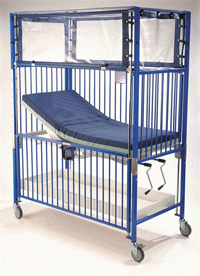
Crib with bars on all sides for youth with disabilities
(Image by Klimer Cribs from third party online catalogues) Details DMCA
The first argument the Supreme Court will hear when it begins its new term on October 3 could determine if this country's entire disability population will be denied the protections of federal law.
We have until then to let our government know we do not support selling off "the "social contract" that provides a decent, functioning society" to Wall Street so shareholders can make bigger profits.
Families like mine stand to lose the right to stay together, even when a child's disabilities are so extensive the only alternative is a cage crib in a hospital somewhere. It was Ronald Reagan who supported extending the social contract to children with disabilities when he gave them federal legal rights to medical care in 1989.
That is what has been happening in Hawaii, where Unitedhealth and Wellcare control two-thirds of the state's Medicaid budget.
Last month Governor Neil Abercrombie admitted the purpose of Act 230 (formerly SB 1274) was to save Hawaii's private Medicaid contractors money on legal fees.
Act 230 goes into effect on January 1, 2012. At that time everyone enrolled in Medicaid loses the right to legal help in fighting life-threatening denials of medical services.
With legal decisions coming down against the state only two days after the governor's "I am failing" speech, Unitedhealth continues until then to wrack up significant legal bills.
Now Abercrombie has found a way to save Unitedhealth money before January 1: by denying reimbursement for expert witnesses that testified on that child's behalf. The state has abruptly reversed a ten year old policy upheld by two previous administrations.
Honolulu attorney Rafael del Castillo represents my daughter Hannah, and five other families of my personal acquaintance. We are all fighting Unitedhealth's on-going denials of medically necessary services on behalf of our children with disabilities, services the state is paying them to provide.
The company is refusing to provide these services because they would cost too much money and that would have a negative impact on shareholder earnings. The services in all cases have been prescribed by our children's doctors.
Del Castillo asks for no money from his clients, even to pay advance costs for expert witnesses. H.R.S. 432E-6 is the state law that makes health insurance companies in Hawaii responsible for the fees incurred by the patient in appealing medical care denials, regardless of who wins the case. Del Castillo takes the chance he he will win in order to get paid. He is up to over 90% wins the last I heard.
Act 230 repeals H.R.S. 432E-6. Del Castillo says last week's move to prohibit reimbursement for expert witnesses goes "as far as the Administration could possibly go to repeal the law before the repeal takes effect on January 1."
When sister legislation to SB 1274 was introduced earlier this year, it turned out to have been drafted by attorneys for Wellcare, the other contractor for the state's disability services program. Interestingly, it would have made enrollees responsible for the legal fees of the insurance company, even when the insurance company lost.
Later the state legislature tried to make SB 1274 retroactive to January 1. Since there were twelve appeals cases pending, it was estimated at the time the measure would save Unitedhealth alone about $500,000.
Del Castillo is representing the person with disabilities in all twelve of these cases.
According to Del Castillo, "the Abercrombie Administration knows that it is making pending patient rights cases ... virtually impossible to win unless one of two things happens: The patient pays for any experts who cannot afford to work for free, or I pay for them. The Abercrombie Administration knows ... that I will have to pay for the experts out of my own pocket or lose the cases. "
(Note: You can view every article as one long page if you sign up as an Advocate Member, or higher).





